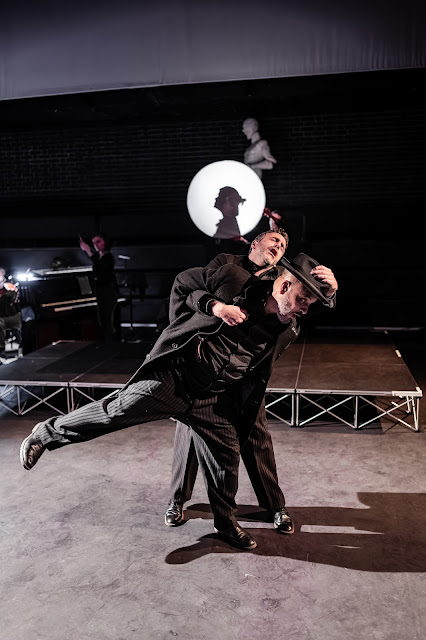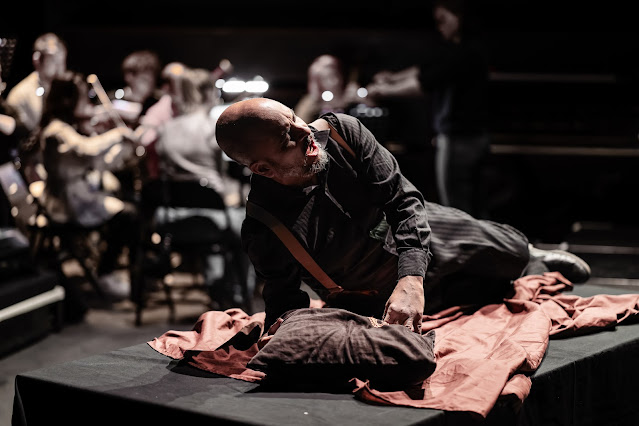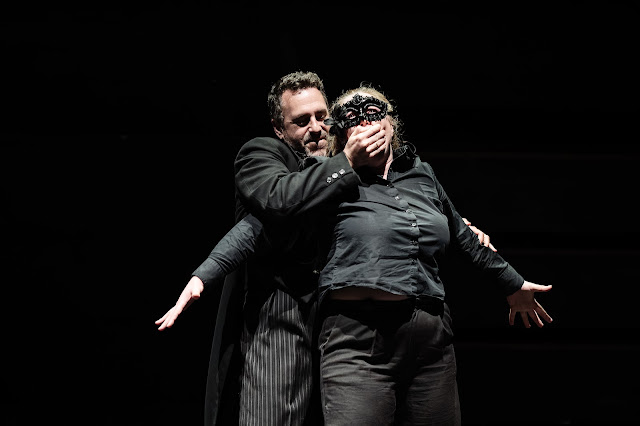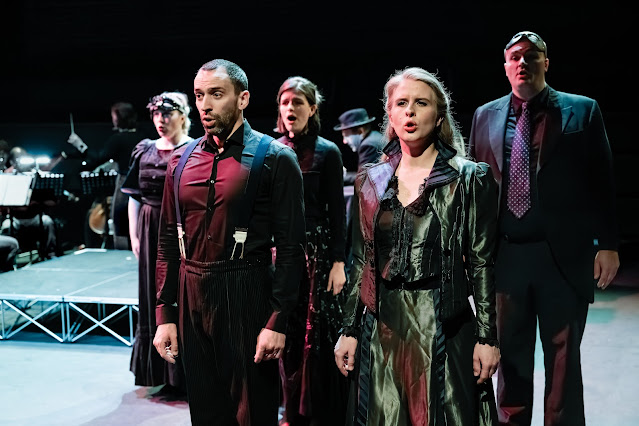 |
| Mozart: Don Giovanni – Ensemble OrQuesta at Grimeborn Festival, Arcola Theatre (Photo: Julian Guidera) |
Mozart: Don Giovanni; Marcio da Silva, Flavio Lauria, Helen May, Rosemary Carlton-Willis, Anna-Luise Wagner, John Twitchen, director: Marcio da Silva, Hastings Philharmonic Orchestra Ensemble, conductor: Andreas Levisianos, Ensemble OrQuesta; Grimeborn Festival at the Arcola Theatre
Reviewed 29 August 2025
A compact chamber version of the opera, notable for its pacey drama and vividly vigorous individual performances
One week, two festivals, two Mozart operas in two very different venues. Following on from Glyndebourne’s performance of Mozart’s Le nozze di Figaro at the Royal Albert Hall for the BBC Proms [see my review], we caught Mozart’s Don Giovanni performed by Ensemble OrQuesta at the Arcola Theatre as part of the Grimeborn Festival where Ensemble OrQuesta has performed annually for the last six years.
On Friday 29 August 2025 we caught Mozart’s Don Giovanni in the Arcola Theatre’s large studio. The company originally performed Don Giovanni in 2017 and Marcio da Silva‘s production was revived and revised earlier this year at the the Cockpit. Ensemble OrQuesta’s artistic director and founder Marcio da Silva both directed the show and performed the title role, with Flavio Lauria as Leporello, Helen May as Donna Elvira, Rosemary Carlton-Willis as Donna Anna, Anna-Luise Wagner as Zerlina, John Twitchen as Don Ottavio, Jay Rockwell as Masetto and Vedat Dalgiran as the Commendatore. Andreas Levisianos conducted an instrumental ensemble of eight drawn from the Hastings Philharmonic Orchestra (of which Marcio da Silva is founder and artistic director). Costumes were by Gil Jenks and puppets by Orlando Bishop.
Ensemble OrQuesta functions very much as a repertory company and all of the cast had performed a number of other roles with the company including last year’s Le nozze di Figaro [see my review] and Handel’s Alcina in 2022 [see my review]. The company’s founder and artistic director Marcio da Silva is something of a Renaissance man, encompassing directing shows, conducting as well as singing. For this run of performances, having directed the show da Silva was alternating singing and conducting this meant that this evening’s conductor, Andreas Levisianos, though he had worked with the company before, was only conducting this one performance which was not ideal.
The instrumental ensemble (string quartet, double bass, flute, clarinet and bassoon) took a little time to settle down. Andreas Levisianos’s speeds in the overture were brisk and there were moments when we missed the sheer weight of a full orchestra, even though the players were admirably incisive. Levisianos also accompanied the recitatives on piano.
The version of the opera used was trimmed so that it lasted 160 minutes (including interval). We had the basic Prague version so no ‘Mi tradi’ for Donna Elvira, but more than that Don Ottavio got neither of his arias and Zerlina’s ‘Batti, batti’ was omitted too. The ending did not hang around either and we ended with the Don’s descent to Hell (cue red glow). The aim was to create a compact version of the drama which matched the intensity and pace of the performance.
 |
| Mozart: Don Giovanni – Ensemble OrQuesta at Grimeborn Festival, Arcola Theatre (Photo: Julian Guidera) |
During the overture we saw Don Giovanni (Marcio da Silva) having fever dreams of ravishing various women, represented by headless mannequins wearing elaborate clothes, manipulated by the cast. Everything was black, the box in which the cast were performing and also the costumes. Anne-Luise Wagner’s Zerlina did wear a leather jacket (along with a floor-length black skirt), but generally the touches of individuality in the costuming did not quite bring out the differences in rank that are so essential to the opera. In many ways, the piece might be a hymn to individual liberty but Don Giovanni’s interactions with Zerlina, Masetto and their friends smacks of aristocratic privilege. Like Le nozze di Figaro, Don Giovanni needs a secure hierarchy in which to function well.
As might be expected from one of da Silva’s shows, this was a highly physical production with the cast constantly on the move. It was played as a chamber drama and we were, indeed, very close to the performers. This meant that they were just as much at a disadvantage as their Glyndebourne counterparts.
At the Royal Albert Hall, singers had to project music and character across wide open spaces. At the Arcola, the cast had the audience up close and personal and the acoustic was somewhat unresponsive and we felt rather too close to some of the bigger voices. In fact, the whole performance had a very in your face feel, and only rarely did it seem to quieten down. In a way, it was unflattering and I have heard these singers before in a more flattering context, here we heard the grain of the voices and even Marcio da Silva’s Giovanni lacked a surface sheen to his voice. The was opera up close and personal.
This vibrancy and drama was reflected in the performance, this was a very vigorous production. Not just in the constant movement, but in the individual intensity with which singers portrayed their roles. Everything was rather fierce, including the comedy which had a real edge to it, a sort of bitterness. The interaction between Don Giovanni and Leporello had an anger to it rather than the usual bantering.
There was a viciousness to Marcio da Silva’s Don Giovanni. He did have the right aristocratic hauter, particularly in the scenes with Zerlina and Masetto, but there was a nasty streak to him too and much of his ‘comedy’ with Flavio Lauria’s Leporello was very pointed. I am not sure that this Giovanni loved anyone, not even himself. There was a compulsion so him which was distinctly unsavoury but which drove the performance forward with remarkable intensity.
 |
| Mozart: Don Giovanni – Ensemble OrQuesta at Grimeborn Festival, Arcola Theatre (Photo: Julian Guidera) |
Flavio Lauria’s rather dry voiced Leporello matched his master admirably, and gave as good as he got. The Catalogue Aria lacked the sense of sly comedy it can have, this Leporello was all character and viciousness like his master. The result was something unsavoury and we didn’t quite feel as sorry for him as we might have done.
There was a fragility to Rosemary Carlton-Willis’ Donna Anna partly because the dryness of the acoustic allied to close proximity emphasised her vibrato at the expense of the core of the voice – something a larger, more sympathetic venue would have compensated for. She was not a power Donna Anna, there was never any sense of a big voice powering through the coloratura, and she was more in need of looking after than some. You almost had sympathy with her, which is saying something.
Helen May was an entirely serious Donna Elvira. She might not have got ‘Mi Tradi’, but there was little sense of the semi-seria character as originally planned by Mozart and Leporello. May was an intense Elvira, mirroring every emotion with her body language. She didn’t feel entirely comfortable in the more virtuoso passages but like Carlton-Willis’ Donna Anna, perhaps a more sympathetic acoustic might have helped.
There was little that was comic about Anne-Luise Wagner’s Zerlina either. She was definitely feisty, and the production made much of the fact that Giovanni was surround by women who were more than capable. It was the women who brought his doom. Her duet with da Silva’s Giovanni was nicely seductive, but full of character and manipulation (from him) too.
John Twitchen’s Don Ottavio, lacking either aria, was a great useless lump who simply hovered around his beloved anxiously and you kept wanting to tell him to get his act together and do something. Jay Rockwell’s Masetto was a bit of an angry nonentity, and the portrayal of the two men did very much lean into the idea of the opera being about the women.
Vedat Dalgiran was a wonderfully hollow-voiced Commendatore, with the height to match. I loved the way in the final scenes, he was portrayed by a creepy looking puppet which definitely felt like an animated statue.
 |
| Mozart: Don Giovanni – Ensemble OrQuesta at Grimeborn Festival, Arcola Theatre (Photo: Julian Guidera) |
This was a very pacey, vigorous production with every line and every note delivered with vibrant intent. In the Arcola Theatre’s larger studio the result was compellingly in your face and I could see that audience goers for whom the fuller version of the opera, lovingly done, might have its longeurs would be drawn into a performance so close that you were effectively in the action.
The blog is free, but I’d be delighted if you were to show your appreciation by buying me a coffee.
Elsewhere on this blog
- The Glyndebourne Prom: Mozart’s Le nozze di Figaro with a young cast on superb form – opera review
- Ravishing delight: Rebecca Meltzer tells the story of Handel’s Semele with engaging clarity at Waterperry Opera – opera review
- BBC Proms: A performance to treasure as Fabio Luisi & the Danish National Symphony Orchestra celebrate their centenary – concert review
- The sound of Carnival: Eversely Mills the band manager of Metronomes Steel Orchestra on sounds and traditions of steel bands – interview
- Le Carnaval de Venise by Campra: Colombian soprano Julieth Lozano gets into the spirit of the carnival for circus opera – guest posting
- Salzburg Festival
- Astonishing kinetic musical theatre: Donizetti’s Maria Stuarda from Ulrich Rasche with Lisette Oropesa & Kate Lindsey – opera review
- Travelling hopefully: defying age & ill health, Daniel Barenboim conducts his West-Eastern Divan Orchestra – concert review
- Youthful tragedy & transcendental mystery: Riccardo Muti & Vienna Philharmonic Orchestra in Schubert & Bruckner – concert review
- Strange & intriguing: Dmitri Tcherniakov directs his first Baroque opera with Handel’s Giulio Cesare – opera review
- Going where no other company has dared: Green Opera gives the stage premiere of Joubert’s Jane Eyre at Grimeborn Festival – opera review
- Home









